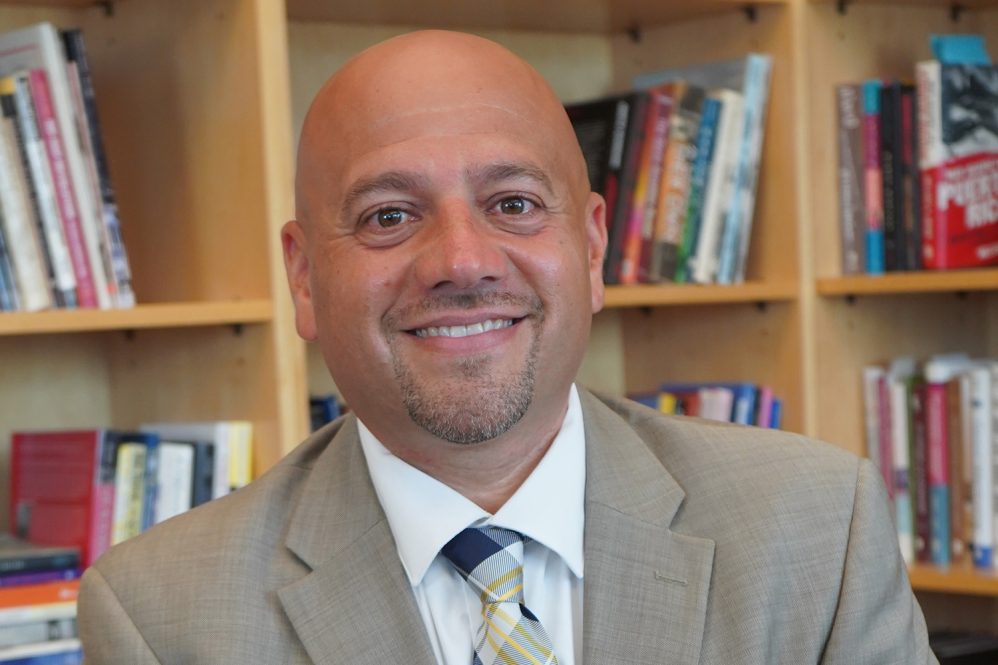UConn Neag School of Education Dean Jason G. Irizarry has been selected for the 2023 Millennium Leadership Initiative, which is a premier leadership development program hosted by the American Association of State Colleges and Universities (AASCU). Irizarry is one of only 29 senior-level higher education professionals selected from around the country for this year’s program.
The Millennium Leadership Initiative (MLI), according to the AASCU website, provides individuals who are traditionally underrepresented in the highest ranks of higher education the chance to develop skills, gain a philosophical overview, and build the networks needed to advance to presidency positions. In doing so, the program emphasizes the importance of diversity on college campuses and helps diversify executive teams.
“I am grateful the American Association of State Colleges and Universities selected me for this incredible learning opportunity,” Irizarry says. “While a significant focus of the MLI program is enhancing the pool of potential college and university presidents from underrepresented groups, I have no doubt that this experience — from the professional development workshops to the mentoring — will help me considerably in my current role as dean of the Neag School.”
Irizarry, who earned his Ed.D. from the University of Massachusetts-Amherst, is also a professor in the Neag School’s Department of Curriculum and Instruction and a faculty associate in El Instituto: Institute for Latina/a, Caribbean and Latin American Studies. He previously served as the Neag School’s interim dean and, prior to that, as associate dean for academic affairs. His research interests include urban teacher recruitment, preparation, and retention with an emphasis on increasing the number of teachers of color, culturally responsive pedagogy, youth participatory action research, and Latino/a students in U.S. schools.
“MLI stands as a magnet for talented people looking to bring something different to American higher education leadership. That is a good thing, because our campuses now face a rare convergence of serious challenges, including disruptive competition, declining enrollments, and volatile governance,” said John S. Wilson Jr., executive director of MLI. “Costs are soaring apace with rising student debt and public doubt. Contextualized by the general instability of American democracy, all that change is requiring something fundamentally different from campus leaders. Now, more than ever, the way MLI prepares presidents and chancellors matters.”
“Our mission at the Neag School is to improve educational and social systems to be more effective, equitable, and just for all. That is the foundation for my work as dean and participating in MLI will help me grow in this work and learn new skills to help us live out these commitments.” — Jason G. Irizarry
The leadership program was originally created to ensure that the next generation of leaders in higher education reflects the diversity of the nation. The program identifies Black, Hispanic, Latino, Asian, and Indigenous leaders in senior-level positions whose intended next career step is a presidency and helps them achieve that goal.
“Our mission at the Neag School is to improve educational and social systems to be more effective, equitable, and just for all,” Irizarry says. “That is the foundation for my work as dean and participating in MLI will help me grow in this work and learn new skills to help us live out these commitments.”
The selection process for the Millennium Leadership Initiative is rigorous, led by a selection committee made up entirely of higher education presidents and chancellors. Once selected for the MLI Institute, participants receive a realistic look at what the role of a president entails, including navigating the current landscape of political polarization inequities and funding shortfalls. Even after the Institute is complete, graduates are assigned a mentor and a coach from a group of presidents and chancellors who assist graduates with the next phases of their careers.
“We have a great incoming class poised to meet the mix of challenges in a way that makes a meaningful difference in America,” Wilson says.
Besides Irizarry, the MLI 2023 cohort includes administrators from Fresno State in California, North Carolina State University, and Gateway Community College in New Haven, to name a few.
“I am humbled and honored to have been chosen alongside such impressive colleagues,” Irizarry says. “I’m looking forward to learning with and from them at MLI meetings.”
AASCU says that, since 1999, nearly 700 individuals have completed the program, with 153 going on to become university presidents or chancellors and 40 serving multiple presidencies or chancellorships.
To learn more about the UConn Neag School of Education, visit education.uconn.edu and follow the Neag School on Instagram, Facebook, Twitter, and LinkedIn.



